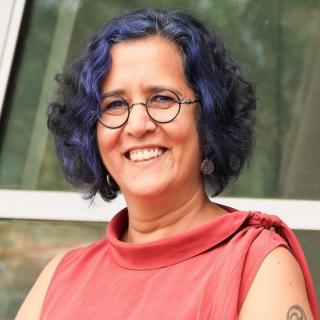Sango Mahanty
Professor, Resources, Environment & Development
I am a human geographer and study the politics of social and environmental change. My earlier research, including an ARC Future Fellowship, explored these related themes in a region of rapid nature-society change along the Cambodia-Vietnam border - for more on this see Unsettled Frontiers: market formation in the Cambodia-Vietnam Borderlands (Cornell). My recent work in this region examines how communities and civil society are responding to dramatic processes of nature-society transformation or “rupture”. I also research the social dimensions of pollution, with a current project on how and why chemical use has escalated in Asian poultry farming and related challenges. I collaborate with civil society and government in Australia and the Asia-Pacific, and teach postgraduate courses on environmental/social impact assessment and pollution/waste.
Areas of expertise
Human Geography
Development Studies
Studies Of Asian Society
Environmental Policy
Research Interests
Political ecology
Critical agrarian studies
Rural development
Pollution
Mainland Southeast Asia (Vietnam, Cambodia)
Social impact assessment
Climate change mitigation and impacts
Teaching
Social Impact Assessment (ANTH8028)
Toxic: Environmental Pollution and Waste (EMDV8017)
Career highlights
Australia-ASEAN Council (current); Ministerial Advisory Committee on Industrial Chemicals (current); Research and Impact Director, Crawford School of Public Policy (2022-2023); Program Director, Resources Environment & Development Group (2018-2020); ARC Future Fellow (2014 - 2018); Vice-Chancellor’s Citation for Outstanding Contribution to Student Learning (2013); Convenor, Deakin University’s Bachelor of Park Management and research partnership with Parks Victoria (2001-2003); Analyst at the Center for People and Forests (2005-2007).
Current and completed research projects
ARC Discovery project (2024-2026)Planet Chicken: Chemical Entanglements in Asia’s Poultry Boom. This project aims to study the effects of Asia’s rapidly expanding chicken meat industry on environmental degradation, social inequality, public health and animal welfare. Agricultural chemicals and veterinary drugs saturate this industry, with little regulation or data on types, quantities and applications. Deploying interdisciplinary methods at key nodes of the chicken value chain in India, Thailand and Vietnam, this study will 1) examine practices and market structures that shape chemical use and 2) uncover chemical presence and socio-ecological impacts. The project intends to expose how toxicity, biodiversity, and health interact with global food systems and to propose interventions for effective governance of factory farming in Asia.
Marsden Fund (2023-2025, led by Alice Beban) Resisting resource grabs: Understanding emotions in environmental conflict in the Mekong River Basin. Resource grabs are threatening people and ecologies across the Mekong region, yet deepening authoritarianism is stoking fear amongst civil society groups about the dangers of resistance. This project breaks new ground by examining the centrality of emotions to projects of state making and resistance across scale. The research will explore how emotions emerge in and inform place-based resource struggles and how they translate across scales in regional collective responses. It will illuminate how emotions facilitate social and ecological change.
ARC Discovery Project (2018-2022) Rupture: nature-society transformations in mainland Southeast Asia. This research examines how transformative landscape and infrastructure developments in mainland Southeast Asia are catalysing new civil society and state responses. Its findings will inform development planning and more inclusive social and environmental policy. The voices of communities affected by environmental change will be amplified, creating opportunities for dialogue. Ground-breaking insights on state-society dynamics will also enhance Australia’s security and regional leadership role.
ARC Future Fellowship (2014-2018) Frontiers of change: resources, access and agency on the Cambodia-Vietnam borderland. This interdisciplinary study examines how local actors negotiate transnational networks and markets on the Cambodia-Vietnam borderland. It will provide critical evidence and theoretical insights on how local environmental, social and political processes intersect wider transitions in this strategically significant region.
The Political Ecology of Forest Carbon - mainland Southeast Asia’s new commodity frontier? (2012-2015) Supported by an ARC Discovery Grant, this study aims to understand how forest users in Vietnam, Cambodia and Laos respond to the complex local, national and regional dimensions of the emerging market for forest carbon.
Safeguarding local equity as global values of ecosystem services rise (2010-2012) Supported by a UK National Environmental Research Council Grant, the project aims to develop a framework to examine equity in the context of ecosystem services. It applies this framework in a series of case studies to explore how local-level equity is affected by changes in the global value of ecosystem services. The project involves several institutions and is coordinated by the University of Southampton.
Crafting Sustainability: addressing water pollution from Vietnam’s craft villages (2009-2012). Supported by an AusAID Australian Development Research Award, the project aims to understand the drivers of pollution from craft villages in the Red River Delta of northern Vietnam.
Student projects
Primary Supervision Role:
Ratchada Arpornsilp: Grassroots environmental movements in an authoritarian state: resource conflicts in Thailand’s Special Economic Zones
Sarou Long: Indigenous Communal Land Title in Cambodia
Jed Alegado: Waste and Degrowth in the Philippines
Advisory Panel Member:
Justin Lau: Waste in Cambodia
Michael Dunford: Political-economic implications of the tea industry in northern Shan State, Myanmar
Teaching
Social Impact Assessment: theory and practice (ANTH8028)
Toxic: Managing Pollution and Waste (EMDV8017)











